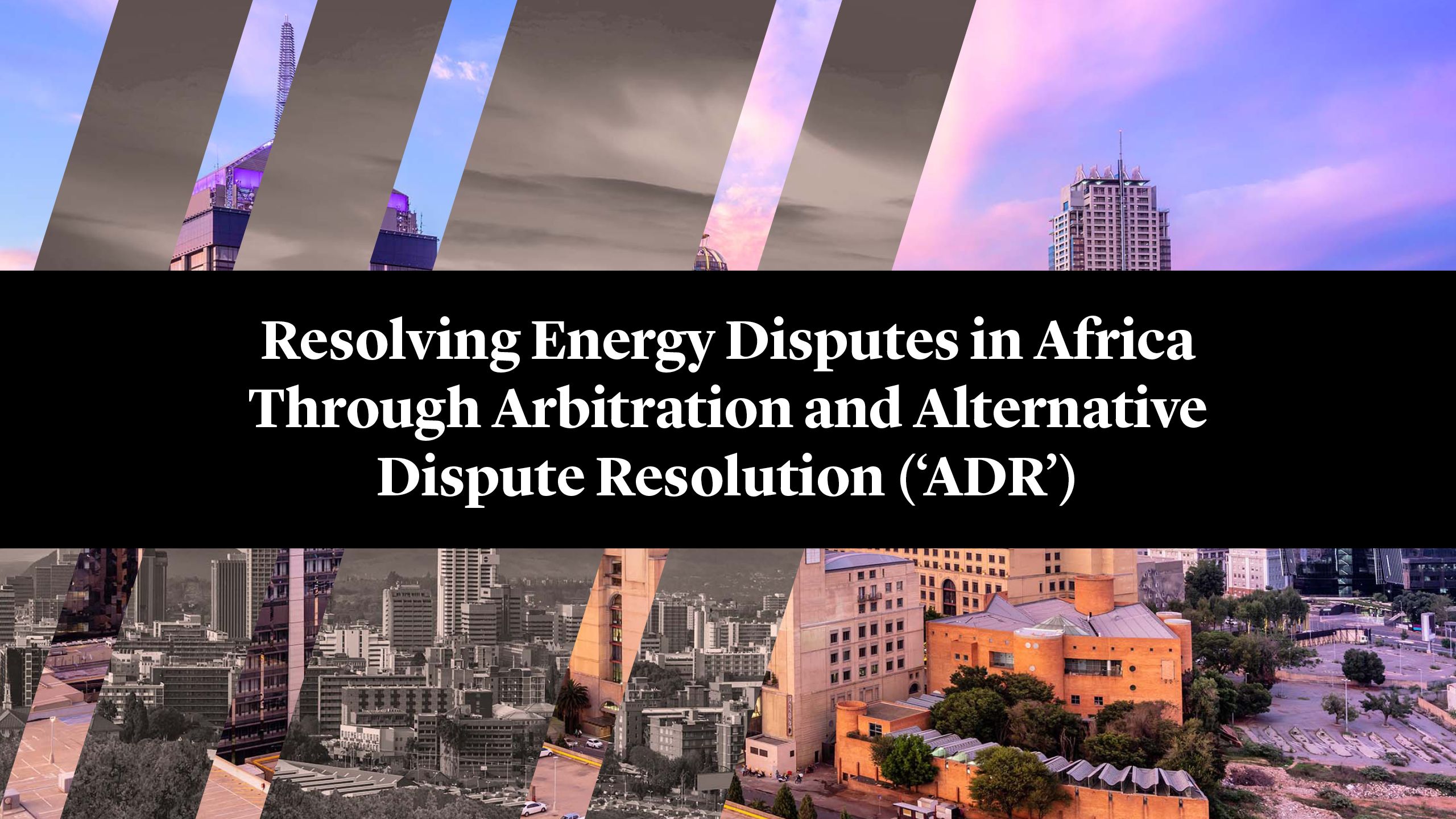
From the effects of the prolonged war in Ukraine, to the energy transition and other geopolitical tensions, the potential for energy-related disputes is on the rise worldwide. Africa is likely to be no stranger to this trend. As the site of major oil and gas reserves and many of the world’s fastest growing economies1, African countries are important players on both the demand and supply sides of the global energy transition. Energy-related disputes in Africa have historically involved unique challenges as a result of state ownership of energy assets and frequent collaboration between state-owned entities and foreign investors, and these challenges will likely persist in disputes concerning the energy transition.
As energy-related disputes on the continent increase in number, parties will be faced with the choice of multiple potential dispute resolution fora. Arbitration is the predominant method of dispute resolution for energy-related disputes on the African continent. Foreign investors’ preference for arbitration may be explained by arbitration’s flexibility, the ability to provide for confidentiality and the ability to enlist specialist, commercial-minded arbitrators to determine the dispute, and its ability to provide for a neutral forum in complex energy disputes involving international parties, particularly when compared to litigation before domestic courts. In view of these advantages of arbitration, it is likely that arbitration as a means of dispute resolution in Africa will continue to grow in importance. There is also particular potential for mediation, as parties to long-term energy contracts may seek to agree mediated solutions rather than escalating their dispute to a judicial forum.
In this article, we explore some of the key issues, looking at why disputes are likely to increase in Africa and exploring the incentives for engaging in alternative dispute resolution – both arbitration and mediation – on the continent.
From the effects of the prolonged war in Ukraine, to the energy transition and other geopolitical tensions, the potential for energy-related disputes is on the rise worldwide. Africa is likely to be no stranger to this trend. As the site of major oil and gas reserves and many of the world’s fastest growing economies1, African countries are important players on both the demand and supply sides of the global energy transition. Energy-related disputes in Africa have historically involved unique challenges as a result of state ownership of energy assets and frequent collaboration between state-owned entities and foreign investors, and these challenges will likely persist in disputes concerning the energy transition.
As energy-related disputes on the continent increase in number, parties will be faced with the choice of multiple potential dispute resolution fora. Arbitration is the predominant method of dispute resolution for energy-related disputes on the African continent. Foreign investors’ preference for arbitration may be explained by arbitration’s flexibility, the ability to provide for confidentiality and the ability to enlist specialist, commercial-minded arbitrators to determine the dispute, and its ability to provide for a neutral forum in complex energy disputes involving international parties, particularly when compared to litigation before domestic courts. In view of these advantages of arbitration, it is likely that arbitration as a means of dispute resolution in Africa will continue to grow in importance. There is also particular potential for mediation, as parties to long-term energy contracts may seek to agree mediated solutions rather than escalating their dispute to a judicial forum.
In this article, we explore some of the key issues, looking at why disputes are likely to increase in Africa and exploring the incentives for engaging in alternative dispute resolution – both arbitration and mediation – on the continent.
Data on Energy Disputes in Africa
A 2022 survey report by Queen Mary University of London (QMUL) outlined the prevailing drivers of disputes in the short to medium term2, and how international arbitration can adapt to this environment to best serve the needs of the energy sector.

Data on Energy Disputes in Africa
A 2022 survey report by Queen Mary University of London (QMUL) outlined the prevailing drivers of disputes in the short to medium term2, and how international arbitration can adapt to this environment to best serve the needs of the energy sector.

Around 28% of respondents believed Africa will see the largest growth in energy-related disputes, driven by an increase in exploration activity in countries like Nigeria and Algeria as the world looks for alternatives to Russian oil and gas. Additionally, disputes may arise in respect of compliance with requirements under concessions and local laws in respect of the decommissioning of oil fields in a safe, environmentally-friendly manner, as assets are either retired or repurposed. Given the heavy presence of foreign investors in the African energy sector, disputes of this kind are likely to arise under both contractual instruments (such as concession agreements) and investment treaties3. The continent has seen a host of energy companies exit the market over the last year as they shift investments to lower-carbon natural gas projects and more profitable opportunities elsewhere. Last year, oil companies including Shell announced plans to scale back or wind down oil production in West Africa, followed by Norway’s Equinor which sold its stake in an offshore Nigerian oil field in January 2023.
In addition, the transportation of Liquefied Natural Gas (LNG), and geopolitical tensions – including both the impact of the Russia-Ukraine war on energy prices, generally, and a shift back towards fossil fuels that may be necessitated by the war – will likely lead to an increase in disputes.

The potential for Africa to be a hive of activity for energy-related disputes is ultimately a consequence of its leading position in global energy production, both in the oil & gas and renewable energy sectors. The continent is home to significant sources of energy, accounting for 7.8% of global oil production and 8.9% of global oil exports4. Africa also accounts for 6.9% of the world’s proven gas reserves, while having significant potential for growth in the development of renewable energy. For instance, according to a report by the International Energy Agency, only around 10% of sub-Saharan Africa’s hydropower potential is currently being exploited5. These statistics imply that disputes in the energy sector are only likely to grow further as prospective energy projects are realized.
Around 28% of respondents believed Africa will see the largest growth in energy-related disputes, driven by an increase in exploration activity in countries like Nigeria and Algeria as the world looks for alternatives to Russian oil and gas. Additionally, disputes may arise in respect of compliance with requirements under concessions and local laws in respect of the decommissioning of oil fields in a safe, environmentally-friendly manner, as assets are either retired or repurposed. Given the heavy presence of foreign investors in the African energy sector, disputes of this kind are likely to arise under both contractual instruments (such as concession agreements) and investment treaties3. The continent has seen a host of energy companies exit the market over the last year as they shift investments to lower-carbon natural gas projects and more profitable opportunities elsewhere. Last year, oil companies including Shell announced plans to scale back or wind down oil production in West Africa, followed by Norway’s Equinor which sold its stake in an offshore Nigerian oil field in January 2023.
In addition, the transportation of Liquefied Natural Gas (LNG), and geopolitical tensions – including both the impact of the Russia-Ukraine war on energy prices, generally, and a shift back towards fossil fuels that may be necessitated by the war – will likely lead to an increase in disputes.

The potential for Africa to be a hive of activity for energy-related disputes is ultimately a consequence of its leading position in global energy production, both in the oil & gas and renewable energy sectors. The continent is home to significant sources of energy, accounting for 7.8% of global oil production and 8.9% of global oil exports4. Africa also accounts for 6.9% of the world’s proven gas reserves, while having significant potential for growth in the development of renewable energy. For instance, according to a report by the International Energy Agency, only around 10% of sub-Saharan Africa’s hydropower potential is currently being exploited5. These statistics imply that disputes in the energy sector are only likely to grow further as prospective energy projects are realized.
Commercial Considerations in Energy Dispute Settlements
When it comes to energy-related disputes, there are multiple considerations for stakeholders:

Time
Disputes in the energy sector can take a very long time to be resolved, during which there may be significant disruptions to energy supply. These have expensive knock-on effects while disputes are pending. Therefore, parties have a particular interest in resolving disputes swiftly. This is evidenced by the 2020 ICC Dispute Resolution Statistics, which show that around half of all Emergency Arbitrator Proceedings under the ICC rules in that year concerned disputes in the infrastructure/energy sectors6. The emphasis on efficiency also makes interim and preventive measures – in the form of interim injunctions, and other such measures designed to minimize disruptions to energy production and supply – during the pendency of energy-related disputes, especially important.

Financial Resources
Arbitration and other protracted disputes are costly, particularly in the energy sector, as they can involve very complicated fact patterns and multiple complicated contracts. The Africa Arbitration Academy’s 2022 report, ‘Survey on Costs and Disputes Funding in Africa’, recently gauged stakeholder views on disputes from 25 African and 11 non-African jurisdictions7. Respondents surveyed considered that the most significant factor driving up arbitration costs was the nature or the value of the dispute8. According to respondents, with respect to arbitrations specifically, energy disputes were the third most expensive type of dispute, behind construction and general corporate/commercial9.

Changes to Economic Context/Commercial Terms
The volatility of economic and commercial contexts became particularly relevant due to the Russia/Ukraine conflict, where there has been an increase in oil prices and demand/supply shifts. One of the leading causes of disputes highlighted in QMUL’s survey report was price volatility of raw materials and energy supply, reflecting potential concerns relating to the impact of the Russia/Ukraine conflict on the security of supply, sanctions, and consequent price volatility10.

Political Context
The political context is of unique importance in African energy disputes because of the widespread state ownership of natural resources, such that a large number of these disputes arise out of concessions and/or joint venture agreements between states and foreign investors.

Relationships With Key
Stakeholders: Lenders,
Regulators, Suppliers, Buyers
Energy projects tend to be active for long periods, such that maintaining good working relationships between joint venture partners is key to ensuring the continued operation and long-term viability of these projects. Where disputes arise, both parties have a natural incentive to focus on preserving their relationship so as to preserve the value of their investment in the energy project in question.
Commercial Considerations in Energy Dispute Settlements
When it comes to energy-related disputes, there are multiple considerations for stakeholders:

Time
Disputes in the energy sector can take a very long time to be resolved, during which there may be significant disruptions to energy supply. These have expensive knock-on effects while disputes are pending. Therefore, parties have a particular interest in resolving disputes swiftly. This is evidenced by the 2020 ICC Dispute Resolution Statistics, which show that around half of all Emergency Arbitrator Proceedings under the ICC rules in that year concerned disputes in the infrastructure/energy sectors6. The emphasis on efficiency also makes interim and preventive measures – in the form of interim injunctions, and other such measures designed to minimize disruptions to energy production and supply – during the pendency of energy-related disputes, especially important.

Financial Resources
Arbitration and other protracted disputes are costly, particularly in the energy sector, as they can involve very complicated fact patterns and multiple complicated contracts. The Africa Arbitration Academy’s 2022 report, ‘Survey on Costs and Disputes Funding in Africa’, recently gauged stakeholder views on disputes from 25 African and 11 non-African jurisdictions7. Respondents surveyed considered that the most significant factor driving up arbitration costs was the nature or the value of the dispute8. According to respondents, with respect to arbitrations specifically, energy disputes were the third most expensive type of dispute, behind construction and general corporate/commercial9.

Changes to Economic Context/Commercial Terms
The volatility of economic and commercial contexts became particularly relevant due to the Russia/Ukraine conflict, where there has been an increase in oil prices and demand/supply shifts. One of the leading causes of disputes highlighted in QMUL’s survey report was price volatility of raw materials and energy supply, reflecting potential concerns relating to the impact of the Russia/Ukraine conflict on the security of supply, sanctions, and consequent price volatility10.

Political Context
The political context is of unique importance in African energy disputes because of the widespread state ownership of natural resources, such that a large number of these disputes arise out of concessions and/or joint venture agreements between states and foreign investors.

Relationships With Key
Stakeholders: Lenders,
Regulators, Suppliers, Buyers
Energy projects tend to be active for long periods, such that maintaining good working relationships between joint venture partners is key to ensuring the continued operation and long-term viability of these projects. Where disputes arise, both parties have a natural incentive to focus on preserving their relationship so as to preserve the value of their investment in the energy project in question.
Institutional Mediation and Arbitration
Institutional mediation and arbitration provide a structure to the dispute resolution process and do away with the need to agree on a procedure. This has significant benefits in the context of African energy disputes. Institutions are also engaging in a variety of steps to promote the use of arbitration and mediation on the continent, so there is a symbiotic relationship between them11.
The Future of Arbitration and Mediation in African Energy Disputes
The Presence of States and
State-owned Enterprises
The involvement of states and state-owned enterprises in African energy disputes has traditionally been one of the key reasons for the popularity of alternative dispute resolution mechanisms. However, concerns persist in this regard – on the state side in particular, there are concerns with public spending on costly dispute resolution processes, as well as risks to public finances and revenue caused by prolonged energy-related disputes. There is, therefore, a natural incentive for states to de-escalate disputes and potentially come to a mediated settlement.
On the private actor/investor side, there are potential challenges with enforcing claims against states, and risks of permanently damaging relationships that make full-fledged arbitration and litigation proceedings less attractive. It follows that there is a push for mediation and de-escalation on their side as well. These complementary incentives mean mediation often takes place, although bureaucratic issues related to state involvement and changed commercial or political circumstances are sometimes significant barriers.
Prospects of UNCITRAL Model Law
on Mediation
Very few African states have signed or ratified the United Nations Commission on International Trade Law’s (UNCITRAL) Convention on International Settlement Agreements Resulting from Mediation (known as the “Singapore Convention on Mediation”), which promotes the use of mediation as a form of alternative dispute resolution by harmonizing the regime for the enforcement of mediated settlements of disputes12 but the signature and ratification pace may pick up. Further, the strong commercial and political justifications for de-escalating disputes and arriving at mediated settlements, particularly in the energy sector, will likely mean that mediation continues to be popular and grow in this area regardless of the popularity of the Convention in Africa.

The Role of Arbitration
While mediation will grow, arbitration is likely to remain the predominant method for resolving African energy disputes. Mediation often may be used as a precursor to arbitration, with agreements or investment treaties frequently providing for “multi-tiered” dispute resolution provisions facilitating escalation of disputes to arbitration in the event that mediation is unsuccessful. It is expected that an overall increase in the scale and volume of African energy disputes will continue, and most of these disputes that are not mediated and settled will be arbitrated. This will remain true on both the commercial and investment treaty side.
The Future of Arbitration and Mediation in African Energy Disputes
The Presence of States and
State-owned Enterprises
The involvement of states and state-owned enterprises in African energy disputes has traditionally been one of the key reasons for the popularity of alternative dispute resolution mechanisms. However, concerns persist in this regard – on the state side in particular, there are concerns with public spending on costly dispute resolution processes, as well as risks to public finances and revenue caused by prolonged energy-related disputes. There is, therefore, a natural incentive for states to de-escalate disputes and potentially come to a mediated settlement.
On the private actor/investor side, there are potential challenges with enforcing claims against states, and risks of permanently damaging relationships that make full-fledged arbitration and litigation proceedings less attractive. It follows that there is a push for mediation and de-escalation on their side as well. These complementary incentives mean mediation often takes place, although bureaucratic issues related to state involvement and changed commercial or political circumstances are sometimes significant barriers.
Prospects of UNCITRAL Model Law
on Mediation
Very few African states have signed or ratified the United Nations Commission on International Trade Law’s (UNCITRAL) Convention on International Settlement Agreements Resulting from Mediation (known as the “Singapore Convention on Mediation”), which promotes the use of mediation as a form of alternative dispute resolution by harmonizing the regime for the enforcement of mediated settlements of disputes12 but the signature and ratification pace may pick up. Further, the strong commercial and political justifications for de-escalating disputes and arriving at mediated settlements, particularly in the energy sector, will likely mean that mediation continues to be popular and grow in this area regardless of the popularity of the Convention in Africa.

The Role of Arbitration
While mediation will grow, arbitration is likely to remain the predominant method for resolving African energy disputes. Mediation often may be used as a precursor to arbitration, with agreements or investment treaties frequently providing for “multi-tiered” dispute resolution provisions facilitating escalation of disputes to arbitration in the event that mediation is unsuccessful. It is expected that an overall increase in the scale and volume of African energy disputes will continue, and most of these disputes that are not mediated and settled will be arbitrated. This will remain true on both the commercial and investment treaty side.
As a result of the aforementioned factors, including the energy transition, the Russia/Ukraine conflict, commercial considerations, and the prevalence of state ownership of resources, the prevailing outlook suggests an increase in energy-related disputes in Africa. Arbitration will likely be the go-to method of alternative dispute resolution despite the benefits of – and potential for an increase in – mediation. Nevertheless, concerns with regard to time and cost relating to disputes call for swift and efficient dispute resolution in Africa, which will likely take the form of alternative dispute resolution methods, especially in this time of volatile economic and commercial contexts.
